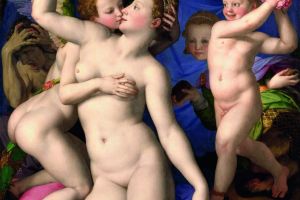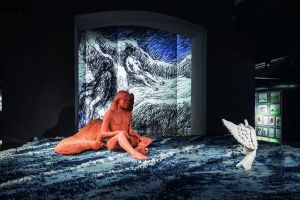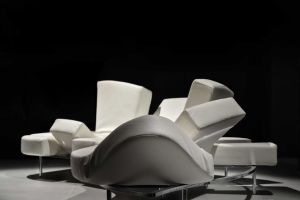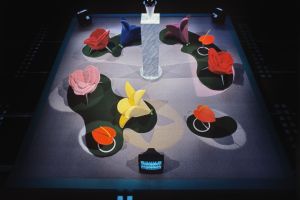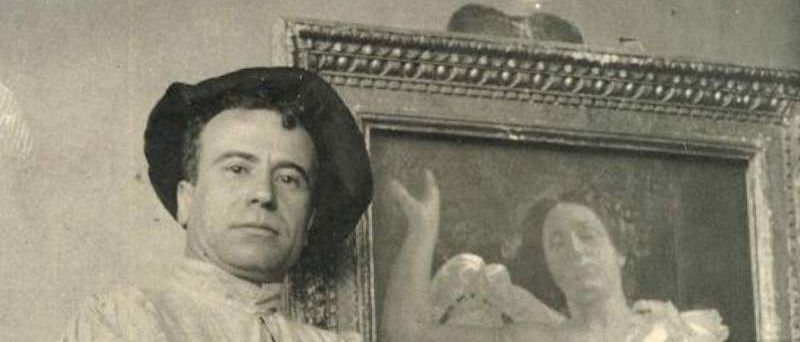
Icilio Federico Joni. The painter portrayed with one of his works.
October 2023
Giampaolo Grassi
There are those who create, and those who copy
Francesco Binfaré says his ideas are generative. Which means that, before they come to him, no such thing exists, nothing similar or even close. One night for example Binfaré cut, from a sheet of paper, the shape of a figure that had just appeared to him in a dream. This became the Flap sofa. A second before, a sofa like this had not existed, nor could one be found in any exhibition, workshop or attic.
The same is true of the Standard cushion, based on his intuition for a smart cushion. The Standard is intelligent because it has the ability to surprise you, taking the position you desire when you sit or lie on it. It does this very naturally, without any show of self congratulation. It is intelligent because it doesn't let you see its intelligence.
However, generative ideas mean that other ideas will come from them. Come perhaps to other people. And this is where the thinking becomes more complicated. One way to express it is, it's one thing to be inspired by a maestro and carry forward the meaning of their message, but it is another thing entirely to cast yourself in a flattering light by saying the same things word for word.
Parallel to this idea there sits an argument that has to do with the relation between art and design.
The source of this controversy has been lost in time, and who knows how long it will continue. Generally speaking it can be summed up as follows: artists discover new pathways of expression, designers anticipate the latent signs of an evolution as it is taking place. Artists take us by the hand into unexplored and imaginary territory, designers draw maps of paths that are possible.
Binfaré has always worked in the world of design, but he is an artist. This is a fact, and no explanations are required. That's how it is, full stop. Anyone who is not satisfied with the evidence in front of them can look at the evidence in the Venice law courts and the archived files of a pending lawsuit.
According to the judge in Venice, citing paragraphs on works of industrial design that add "artistic value" to "creative character", Binfaré's Standard sofa is subject to protection under copyright law. It has been necessary for Binfaré and his art to take up the time of magistrates because over the years several companies, large and small, have let themselves be inspired too casually by his ideas. Binfaré's most popular works among these less opportune fans are the On The Rock and Standard sofas, and his intelligent cushion.
It is true that certain authors feel flattered when people copy them. But the homage sometimes feels like cheating, and the line between referring to an author and mocking them disappears. Edra has always had to deal with this. Sofas resembling Binfaré's, armchairs that remind us of Masanori Umeda's, furnishing similar to the Campana brothers', seating that looks like Jacopo Foggini's, and more. Cunning specimens abound, mixing and appropriating styles, materials, solutions and patterns that belong to nearly forty years of Edra tradition.
Sadly this story is as old as time. A genuinely talented painter by the name of Federico Joni once lived in Siena. In the early twentieth century he began to paint fourteenth and fifteenth century pictures, works from several centuries earlier, deliberately antiqued from start to finish, though his buyers were unaware of this. He managed to sell his paintings to dealers and to great collectors. Until one day an art historian who, despite his calling, owned some of Joni's paintings, discovered the fraud. Joni openly confessed, but added a note of mockery: "It is easy to tell which are my paintings - he revealed - because they all have the signature Paicap". Each of his canvases, hidden from view, carries a signature made of initials that correspond to the first letters of words in a sentence.
We won't transcribe that sentence verbatim here for reasons of decorum, and because we do not wish to offend the sense of common decency. A quick search on internet will satisfy the curious: suffice to say the offending word starts with a "c". However the meaning of the sentence is not difficult to convey. It is "for me to make fun of others by tricking them."
And this perhaps will make us smile or inspire our sympathy. But it is something you simply must not do. Then, as now.
P.S. Joni organized an exhibition of his paintings in Florence In 1909. His own original paintings - not copies. It was a flop.
 |
Giampaolo Grassi Parliamentary reporter for the Italian Press Agency Ansa. Before taking an interest in politics, he was in charge of legal news in Florence and fi nancial news in Milan. |





